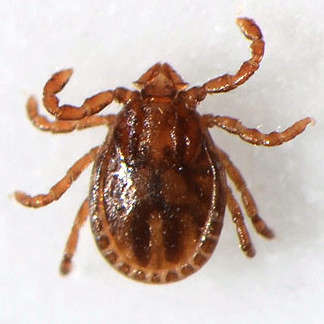
The Asian long-horned tick has been confirmed in Missouri and Arkansas. The tick is less attracted to human skin and poses a bigger threat to livestock.
The Missouri Department of Agriculture has been working with the Missouri Department of Health and Senior Services and Missouri State University to confirm the species in the Show-Me-State
The department says the Asian long-horned tick is light brown and very small. The tick can sometimes be smaller than a sesame seed.
The CDC says this species is unlike others because a single female Asian long-horned tick can produce as many as 1,000 offspring at a time without mating. The department says that means an individual animal could host thousands of ticks.
Officials recommend producers take protective measures and check their livestock regularly for ticks. They also suggest keeping grass and weeds trimmed.
“They’re definitely different than typical ticks we worry about,” said Grant Dewell, chief extension veterinarian at Iowa State University.
“If you contrast that with the typical tick we’re used to seeing on our pets, or livestock, or ourselves, that are about the size of a pencil eraser. These are a lot smaller and harder to see, but the other thing about them is that they reproduce rapidly.”
Asian long-horned females can lay several thousand eggs and reproduce without mating. Pets, livestock, wildlife, and people are most at risk.
“The fact that they’re so small they go unnoticed for quite a while,” Dewell said.
“So, we don’t get to see these easily observed ticks. You have to stop and look at your animals really closely to see if they have sesame seed-sized ticks crawling on them. So, they’re easy to miss.”
The ticks, native to East Asia are likely to have come to the United States in 2017 aboard a ship where cattle were being moved.
It’s recommended to use repellent such as DEET, for your animals maintaining flea and tick medicine, and for livestock producers, trimming grass in and around pastures.
“We’ve definitely seen more of the common ticks we typically see the deer ticks and brown dog ticks, those are more prevalent as well,” Dewell said.
“We’re seeing these Asian longhorn ticks spreading, typically in the Eastern U.S. It’s been found in Arkansas and Missouri as well. It’s slowly getting across the U.S. and something we need to watch out for as we get into late summer.”
Missouri and Arkansas are now among 16 states with this species.
(Story by: Becky Willeke and Patrick Clark, Ozarks First)





 Branson Public Works Spends Christmas Eve Fixing Water Main Break
Branson Public Works Spends Christmas Eve Fixing Water Main Break
 Ticket Purchased in Arkansas Wins Powerball Jackpot
Ticket Purchased in Arkansas Wins Powerball Jackpot
 New Officers for Troops D, G of the Missouri State Highway Patrol
New Officers for Troops D, G of the Missouri State Highway Patrol
 Record High Temperatures Possible in the Ozarks for Christmas
Record High Temperatures Possible in the Ozarks for Christmas
 Propane Spill Tuesday Causes Evacuation of Area Near Jasper
Propane Spill Tuesday Causes Evacuation of Area Near Jasper